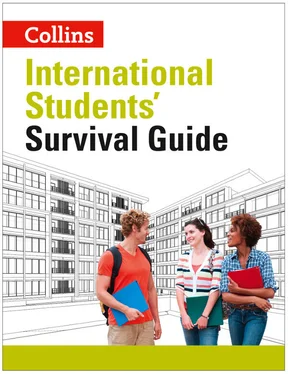Give yourself time to rest after your flight, especially if it’s a long one. Don’t plan to do too much for the first couple of days. Make sure you know how to get to where you’re staying from the airport when you arrive. Keep your first address details with you at all times so you know how to get back to where you’re staying.
If you plan to find somewhere to stay after you arrive, make sure you have temporary accommodation (a hotel, a friend’s place) where you can stay for at least two weeks if necessary. Finding somewhere long-term to live may take longer than you think.
Even if you’re living on or very close to campus, you’ll probably want to travel around the town sometimes to go shopping, sightseeing, or have fun. How do you plan to travel in your new country? Here are some options to look at.
On foot:If you’ll be living on campus and close to shopping and entertainment, you may be able to walk to most places. Make sure you wear comfortable shoes, especially if your campus is large! Some institutions can arrange for a security guard to go with you if you’re nervous walking around the campus after dark, or you can call a saferide service (in many parts of the US). Be sure of safety issues around your campus before you walk around too much.
In the UK, the weather is very changeable, so take an umbrella with you even if it’s not raining.
Campus bus:Institutions which have very large campuses or more than one campus may have free buses for students and staff to get around more easily.
Bicycle:Cycling is a cheap and effective way to travel short distances. Check the laws for cyclists in your new country: Do all cyclists have to wear helmets? Is it legal to cycle on the sidewalk/pavement? In the US, it’s not illegal to cycle on the sidewalk, but it might annoy people who are walking. Bicycle lights and a bell may be a requirement; you may need to buy these separately. Make sure you buy a strong lock for your bicycle (not just a thin chain!): bicycles are often stolen on campus.
Car:If you plan to drive in your new country, bring your driver’s license with you and research the laws for drivers from other countries. The traffic regulations may also be different from what you are used to—avoid fines by reading the highway code. Make sure you can afford to drive: buying or renting a car, paying for fuel, parking, and repairs and so on can be very expensive. If you plan to drive to classes, check the cost and availability of parking on campus and near campus.
Public transportation:What public transportation is available around campus and where you plan to live? Check the fares and whether you can get a student concession or student discount. Do you need to pay beforehand, with prepaid cards or exact cash? This can differ from city to city. Check transportation timetables: international students sometimes find that buses and trains stop running earlier and run less often than they are used to. You may also find that buses are not as reliable, so allow extra time for traveling if you’re not sure.
Cab/Taxi:Cabs/Taxis are generally quite expensive in English-speaking countries. In the US, unless you’re in a big city such as New York or Chicago, you’ll have to call a cab/taxi ahead of time. You should tip in the US—15–20 percent is the norm. In Australia and New Zealand, passengers often sit in the front next to the driver instead of in the back seat. In the UK, there are two types of cabs/taxis. You can hail a black cab on the street if their amber light is on, but private hire cars (“mini-cabs”) need to be booked before the trip on the phone or in person. It’s not necessary to tip the driver but passengers often round the price up.
Don’t be careless with cash … or caught out at Customs and Immigration! Make sure you budget for what you need before you leave home, and manage your money wisely when you’re there. Make sure too that you bring all crucial paperwork. Without the documents you need, you may not be allowed to enter the country!
Here is a basic list of documents you should bring. You may need others, depending on what you plan to do in the new country.
your passport and visa details
your health/travel insurance details
prescription for any medication you take regularly
prescription for your glasses or contact lenses
your driver’s license, if you have one (even if you don’t plan to drive overseas, photo ID is a useful thing to have)
documents from the institution where you’ll be studying (the offer letter, Confirmation of Enrollment, class details, etc.)
For many international students, their study abroad experience is the first time they have ever had to take care of their own money. Make sure you have a realistic idea of how much money you’ll need, and keep track of how much money you’re earning and spending. You don’t want to be under financial stress while you’re studying!
How much money you’ll need will depend on where you’ll be living and what sort of lifestyle you choose. Contact your institution or check their website—many institutions tell students roughly how much they should expect to spend on rent, bills, and groceries. Here is a list of things to consider:
your income (money from your parents, money from work (if it’s legal))
accommodation (rent, furniture, bed linen, cleaning products, electrical appliances, etc.)
bills (telephone, gas, electricity, water, Internet service, cable TV, etc.)
transportation (public transportation tickets, cab/taxi fares, car expenses like fuel, insurance, tax, road tolls, and maintenance if you plan to drive)
study-related (study fees, textbooks, stationery, IT related, photocopying, etc.)
health (insurance payments, doctor, optometrist/optician, glasses or contact lenses, physiotherapist, dentist, etc.) In the UK you may be able to go to a National Health Service (NHS) doctor or hospital for free, but medical insurance is still a good idea. In the US, health costs can be huge. Make sure you understand your insurance policy and how much you’ll have to pay at the time of the visit (co-pay), or for medicine. Don’t go to the Emergency Room for anything other than a true emergency.
food (groceries, eating out, etc.)
recreation (travel, concerts, movies/films, entry fees, nights out, gym fees, etc.)
personal (clothing, cosmetics, haircuts, etc.)
Many students help support themselves by doing part-time work. If you plan to do this, check your visa restrictions. Most student visas have rules about the number of hours you’re allowed to do paid work, and the number of hours when you’re expected to attend classes. Only some jobs are open to international students. Some will only be open to citizens or permanent residents of the country. In the US, these jobs must be campus-related jobs.
Many institutions have an employment service for students who are looking for jobs. This service is a great place to start, as the service will help you find a job that is suitable for a student. They may also help you with the process of applying for a job.
Online job search engines like www.seek.comor www.monster.com/.co.ukare also great places to look for work. With these, you enter the town where you want to work and the type of job you want. The search engine comes up with a list of jobs.
Читать дальше












